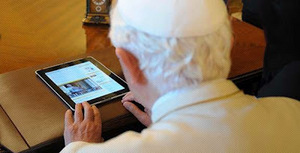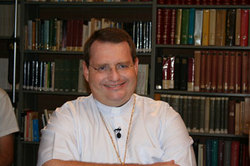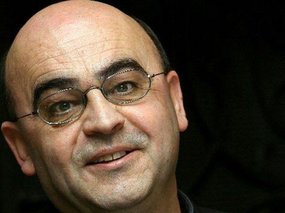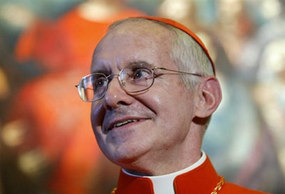Real Christian discipleship rejects and resists the kind of radical personal license and acquisitiveness that animates a consumerist society. So when the Catholic Church teaches about the dignity of the unborn child, the purpose of human sexuality, economic and immigration justice, the rights of religious communities and believers, and the nature of marriage and the family - she's not just "unpopular." She's hated as the enemy of individual privacy and personal freedom. And that theme shapes the way the Church is treated in the mass media.For Catholics in my country to recover their vocation as a Church, they need to be awakened; they need a reason to be zealous again about their faith. They need to hear the witness of people like yourselves who live the Catholic faith with confidence and joy. They need to see their Church growing and fruitful, and young again, instead of constantly retreating and in decline.This is the value of the new ecclesial communities and movements. They're alive in Jesus Christ, and their new life and energy spill out into the whole Church.
Evangelization & Formation: November 2012 Archives
 The Pope will tweet. Is this a mortal sin or a gospel value?
The Pope will tweet. Is this a mortal sin or a gospel value? Tommaso Spinelli, 23, a catechist of young catechumens who
works at the Catechetical Office of the Diocese of Rome, has some good things to say:
Tommaso Spinelli, 23, a catechist of young catechumens who
works at the Catechetical Office of the Diocese of Rome, has some good things to say:The new evangelization needs substance: it needs catechesis of a certain depth that is able to say something serious to our lives, but also and above all it needs lives of substance that demonstrate through actions the solidity of the Christian. It is even more important today, now that families are disunited and often abdicate their educative role, that priests demonstrate to the young their faithfulness to a vocation and the possibility of choosing an alternative way of living, better than that proposed by society.My concern however is that these figures of substance are becoming a minority. The priest has lost trust in the importance of his ministry, he has lost charisma and culture. I see priests who adapt to the dominant thought. The same is true of the liturgy, which in the attempt to become original becomes meaningless. Priests, I ask you to find the courage to be yourselves. Do not fear because where you are truly priests, there you propose the truth of the faith without fear, we the young will follow. Indeed, the words of Peter are also ours: "Lord, to whom shall we go? You have the message of eternal life". And we are infinitely hungry for something eternal and true.I therefore propose:

The Cambodian Catholic experience is not something that rolls off our lips at cocktail parties or lunch dates in the USA. But the Asian perspective is needed: how does the Good News get rooted. Notice his points at the end of the post.
The rather young bishop, The Most Reverend Olivier Michel Marie Schmitthaeusler, MEP, 42, vicar apostolic of Phnom Penh, Cambodia since 2010 told the Pope and the Synod:
The Khmer Rouge genocide killed bishops, priests, religious persons and the majority of Christians. For twenty years now, we are living a new time of the Acts of the Apostles with a first announcement of the Good News ensured by the small group of survivors, supported by the massive arrival of missionaries. Today we have about 200 adult baptisms each year... The small Church of Cambodia is in some ways a laboratory for evangelization in a Buddhist world, fully entered into a process of secularization driven by globalization a bit like the Asian dragons. The Ad Extra Mission is intimately tied to the Ad Intra Mission. Ad Extra and Ad Intra are mutually enriched by stimulating each other with the same and unique Mission of Evangelization!
 At the Synod of Bishops men and women from all parts of the world gathered in Rome in October to speak on matters pertaining to evangelization. We in the USA, need perspective: the lower Europe and North America is not the only place where the Christian faith is incarnated. The bishop of Tromso since 2009,
Norway, Berislav Grgić, 52, said to the Synod Fathers:
At the Synod of Bishops men and women from all parts of the world gathered in Rome in October to speak on matters pertaining to evangelization. We in the USA, need perspective: the lower Europe and North America is not the only place where the Christian faith is incarnated. The bishop of Tromso since 2009,
Norway, Berislav Grgić, 52, said to the Synod Fathers:The Catholic Church in the Northern Lands - Denmark, Finland, Iceland, Norway and Sweden - is a very small minority and therefore has neither the advantages nor the disadvantages that the Catholic Church often comes across in traditional and prevalently Catholic regions. Despite its limited relevance, numeric as well as social, our Church is nonetheless a growing Church. New churches are built or bought, new parishes are instituted, non-Latin rites are added, there is a relatively high number of adult conversions and baptisms, there are vocations to priesthood and to religious life, the number of baptisms is much higher than the number of deaths and number of those who abandon the Church, and attendance at Sunday Mass is relatively high.
Hearing the call to conversion that came from the synod hall, I could not help but remember the call that Fr. Giussani issued many years ago in Viterbo, inviting us to "recover the truth of our vocation and our commitment." Because we, too, he told us, run the risk of "reducing our commitment too a kind of theorization of a socio-pedagogical method, reducing it to a kind of activism that follows upon this theorization, and then a commitment to the political defense of it. Instead, our task is to reaffirm and to propose to man, our brother, a fact of life.
 In the time following the Synod of Bishops on the New Evangelization I think we need to review what was said. So often we move on so fast when an event is finished. A judgment, that is, an assessment, is required to understand with clarity and charity.
In the time following the Synod of Bishops on the New Evangelization I think we need to review what was said. So often we move on so fast when an event is finished. A judgment, that is, an assessment, is required to understand with clarity and charity. Christians often ignorant of the content of their own faith and incapable because of this of living of and for it, are not capable of interreligious dialogue that always begins with the assertion of one's own convictions: there is no room for syncretism or relativism! Faced with adepts from other religions with a strong religious identity, it is necessary to present motivated and doctrinally equipped Christians. This makes the new evangelization a priority to form coherent Christians, capable of demonstrating their faith, with simple words and without fear.



